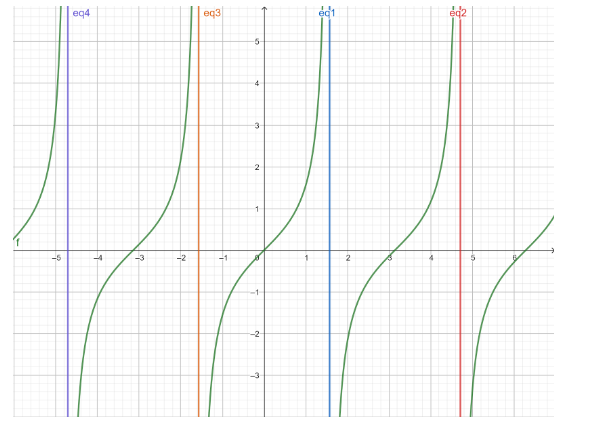
How do you find vertical asymptote of tangent function ?
Answer
543.6k+ views
Hint: In the given question, we are required to find out the vertical asymptotes of the tangent function. Asymptote is a straight line that continually approaches a given curve but does not meet it at any finite distance. So to find vertical asymptotes for tangent function, we have to calculate the derivative of the function and see the nature of the curve at different points. Then, we equate the derivative of the function to infinity so as to find the points where the vertical asymptotes for the tangent function exists.
Complete step by step solution:
To solve the given question and find the vertical asymptote of tangent function, we first find out the derivative of the function.
So, $ f\left( x \right) = \tan \left( x \right) $
Hence, $ f'\left( x \right) = {\sec ^2}\left( x \right) $
Now, equating the derivative to infinity since the slope of the function has to be infinity so as to have a vertical asymptote.
So, for $ f'\left( x \right) = {\sec ^2}x = \dfrac{1}{{{{\cos }^2}\left( x \right)}} $ to be infinity, the denominator must be zero.
Hence, we get, $ {\cos ^2}\left( x \right) = 0 $
$ \Rightarrow \cos \left( x \right) = 0 $
$ \Rightarrow x = \left( {\dfrac{{n\pi }}{2}} \right) $ where n is any integer.
So, the tangent function has a vertical asymptote for every integral multiple of $ \left( {\dfrac{\pi }{2}} \right) $ .

Note: One should have thorough knowledge of differentiation and applications of derivatives in order to solve such questions. We should also know the definition of an asymptote. Algebraic rules like transposition must also be practiced as they are used often in mathematical equations.
Complete step by step solution:
To solve the given question and find the vertical asymptote of tangent function, we first find out the derivative of the function.
So, $ f\left( x \right) = \tan \left( x \right) $
Hence, $ f'\left( x \right) = {\sec ^2}\left( x \right) $
Now, equating the derivative to infinity since the slope of the function has to be infinity so as to have a vertical asymptote.
So, for $ f'\left( x \right) = {\sec ^2}x = \dfrac{1}{{{{\cos }^2}\left( x \right)}} $ to be infinity, the denominator must be zero.
Hence, we get, $ {\cos ^2}\left( x \right) = 0 $
$ \Rightarrow \cos \left( x \right) = 0 $
$ \Rightarrow x = \left( {\dfrac{{n\pi }}{2}} \right) $ where n is any integer.
So, the tangent function has a vertical asymptote for every integral multiple of $ \left( {\dfrac{\pi }{2}} \right) $ .

Note: One should have thorough knowledge of differentiation and applications of derivatives in order to solve such questions. We should also know the definition of an asymptote. Algebraic rules like transposition must also be practiced as they are used often in mathematical equations.
Recently Updated Pages
Master Class 12 Economics: Engaging Questions & Answers for Success

Master Class 12 Physics: Engaging Questions & Answers for Success

Master Class 12 English: Engaging Questions & Answers for Success

Master Class 12 Social Science: Engaging Questions & Answers for Success

Master Class 12 Maths: Engaging Questions & Answers for Success

Master Class 12 Business Studies: Engaging Questions & Answers for Success

Trending doubts
Which are the Top 10 Largest Countries of the World?

What are the major means of transport Explain each class 12 social science CBSE

Draw a labelled sketch of the human eye class 12 physics CBSE

Why cannot DNA pass through cell membranes class 12 biology CBSE

Differentiate between insitu conservation and exsitu class 12 biology CBSE

Draw a neat and well labeled diagram of TS of ovary class 12 biology CBSE




